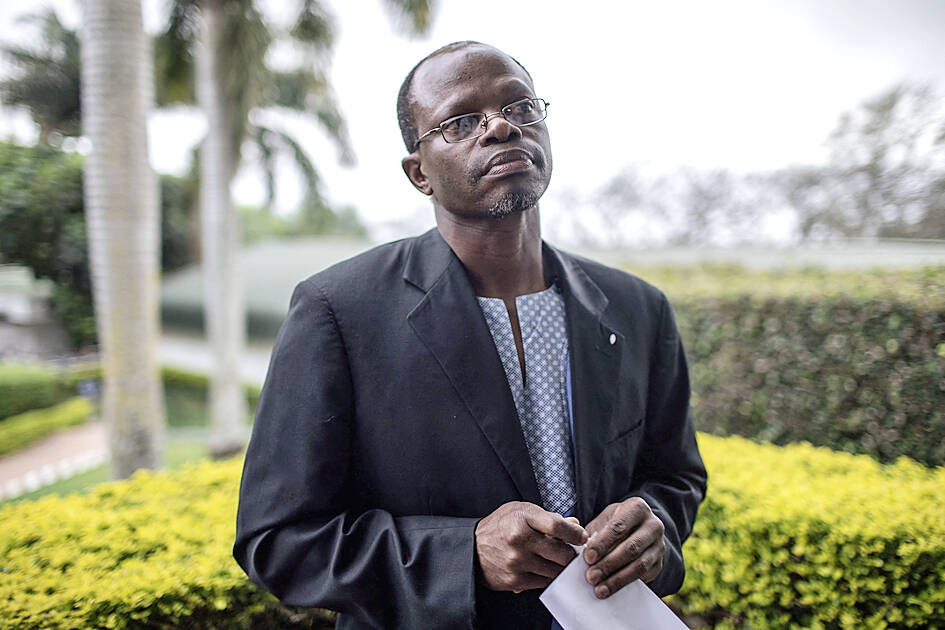Gunmen in Eswatini killed a prominent opposition politician and human rights lawyer at his home, a spokesman told reporters on Sunday, hours after the country’s absolute monarch challenged advocates opposed to his rule.
Thulani Maseko was shot dead on Saturday night by unknown attackers in Luhleko, about 50km from the capital Mbabane, opposition spokesman Sikelela Dlamini said.
The spokesman said he was told “assassins shot him through the window while he was inside [the] house with his family.”

Photo: AFP
“Details are still scant [and], owing to the trauma his family members are undergoing, they are not yet ready to speak,” Dlamini added.
The government sent condolences to the family, saying Maseko’s death was a “loss for the nation” and that police were searching for the killers.
Maseko was a leading human rights lawyer and columnist in Eswatini who had a pending court battle with King Mswati III over the monarch’s decision to rename the country Eswatini by decree.
The country’s name was changed from Swaziland to Eswatini to mark the 50th anniversary of its independence from Britain in 2018.
Maseko’s position was that the king had not followed the constitution in the process.
In 2014, he and the editor of **The Nation** magazine, Bheki Makhubu, were jailed for contempt of court over articles critical of the government and judiciary.
Maseko was the founder of MSF, a coalition of opposition parties, associations and churches.
His death came just hours after the king challenged advocates fighting to end Africa’s last absolute monarchy.
“People should not shed tears and complain about mercenaries killing them,” King Mswati had said.
“These people started the violence first, but when the state institutes a crackdown on them for their actions, they make a lot of noise blaming King Mswati for bringing in mercenaries,” he said.
Last week, the Swaziland Solidarity Network said that the king had hired mercenaries, mainly white Afrikaners from South Africa, to help Eswatini’s security forces suppress rising opposition to his regime.
However, government spokesman Alpheous Nxumalo said “no hitmen have been hired.”
Rights group Freedom Under Law, which operates across southern Africa, pointed a finger at the government.
“Somehow the stunning news that Thulani Maseko has been gunned down in cold blood comes as no surprise,” it said in a statement.
“A ceaseless and fearless human rights lawyer, an outspoken critic of the regime in his beloved Eswatini, Thulani had all too long suffered at the hands of a heedless regime,” the group said.
“No one can be misled by the cynical message of condolence put out on behalf of the government,” it added.
The EU called for the killers to be caught and voiced “grave concern” about the situation in Eswatini.
“The EU calls on the authorities to ensure the safety of all citizens, including political activists,” it said in a statement.
“This tragic loss comes in a row of killings, arson attacks and other violent acts, which have destabilized the country over the past months,” it added.
The bloc urged the authorities to urgently launch “inclusive dialogue ... towards national reconciliation, respect for human rights and the rule of law, and ultimately, lasting peace.”
The US embassy in Mbabane expressed “profound sadness” and extended “deepest condolences to Mr Maseko’s family, friends and admirers around the world.”

The collapse of the Swiss Birch glacier serves as a chilling warning of the escalating dangers faced by communities worldwide living under the shadow of fragile ice, particularly in Asia, experts said. Footage of the collapse on Wednesday showed a huge cloud of ice and rubble hurtling down the mountainside into the hamlet of Blatten. Swiss Development Cooperation disaster risk reduction adviser Ali Neumann said that while the role of climate change in the case of Blatten “still needs to be investigated,” the wider impacts were clear on the cryosphere — the part of the world covered by frozen water. “Climate change and

Poland is set to hold a presidential runoff election today between two candidates offering starkly different visions for the country’s future. The winner would succeed Polish President Andrzej Duda, a conservative who is finishing his second and final term. The outcome would determine whether Poland embraces a nationalist populist trajectory or pivots more fully toward liberal, pro-European policies. An exit poll by Ipsos would be released when polls close today at 9pm local time, with a margin of error of plus or minus 2 percentage points. Final results are expected tomorrow. Whoever wins can be expected to either help or hinder the

Packed crowds in India celebrating their cricket team’s victory ended in a deadly stampede on Wednesday, with 11 mainly young fans crushed to death, the local state’s chief minister said. Joyous cricket fans had come out to celebrate and welcome home their heroes, Royal Challengers Bengaluru, after they beat Punjab Kings in a roller-coaster Indian Premier League (IPL) cricket final on Tuesday night. However, the euphoria of the vast crowds in the southern tech city of Bengaluru ended in disaster, with Indian Prime Minister Narendra calling it “absolutely heartrending.” Karnataka Chief Minister Siddaramaiah said most of the deceased are young, with 11 dead

DENIAL: Musk said that the ‘New York Times was lying their ass off,’ after it reported he used so much drugs that he developed bladder problems Elon Musk on Saturday denied a report that he used ketamine and other drugs extensively last year on the US presidential campaign trail. The New York Times on Friday reported that the billionaire adviser to US President Donald Trump used so much ketamine, a powerful anesthetic, that he developed bladder problems. The newspaper said the world’s richest person also took ecstasy and mushrooms, and traveled with a pill box last year, adding that it was not known whether Musk also took drugs while heading the so-called US Department of Government Efficiency (DOGE) after Trump took power in January. In a